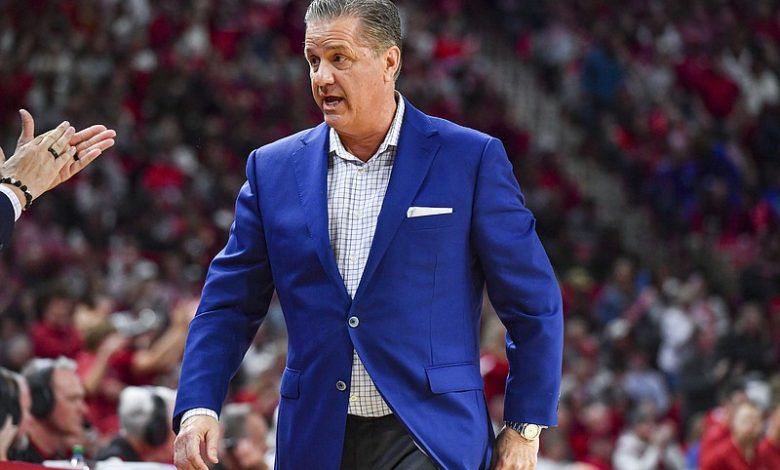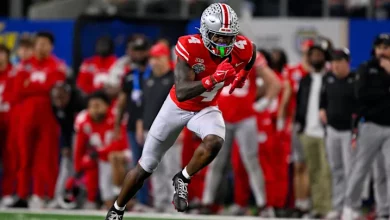After Arkansas blows a 12-point lead to lose against the LSU Tigers, John Calipari accepts responsibility, saying, “I got to do a better job with my team.”

After Arkansas Blows a 12-Point Lead to Lose Against LSU Tigers, John Calipari Accepts Responsibility, Saying, “I Got to Do a Better Job with My Team”
In an exhilarating college basketball game filled with dramatic shifts in momentum, the Arkansas Razorbacks suffered a heartbreaking defeat to the LSU Tigers. Leading by as many as 12 points in the second half, Arkansas let the game slip away, ultimately falling 78-74 to LSU. Despite the heart-wrenching loss, it wasn’t the players alone who bore the brunt of the defeat. In a candid postgame interview, Arkansas head coach John Calipari accepted full responsibility for the loss, telling the media, “I got to do a better job with my team.”
The loss was an emotional rollercoaster for both teams, with Arkansas looking poised for a comfortable win before LSU mounted a furious comeback in the final minutes of the game. Throughout the contest, both teams displayed flashes of brilliance, but it was LSU that maintained its composure when it mattered most. For Arkansas, the loss raised concerns about their ability to close out tight games and manage late-game situations.
While Calipari’s comments resonated with those who believe that coaching plays a pivotal role in a team’s success, the aftermath of the loss brings to the forefront a series of questions about Arkansas’ season, the team’s development, and how the Razorbacks can overcome adversity moving forward.
This article will break down the key moments of the game, assess the role of coaching in the outcome, analyze John Calipari’s responsibility in the loss, and examine what this defeat means for Arkansas’ aspirations. Additionally, we’ll look at the impact of the loss on Arkansas’ future and what changes, if any, need to be made to ensure they can bounce back from this disappointment.
The Game: A Tale of Two Halves
When the Arkansas Razorbacks took the court against LSU on Saturday, they looked like the team poised to secure an important conference win. The Razorbacks came out strong, displaying a well-rounded offensive attack and a defense that stifled LSU’s initial efforts. Arkansas built a 12-point lead in the second half, and their play seemed to indicate they were in control of the game.
The team’s success during the first part of the game was highlighted by their stellar shooting, effective ball movement, and a high-energy defense that had LSU scrambling for answers. Arkansas’ players were executing their plays with precision, and they looked like a team that would easily cruise to victory. However, as has often been the case for teams in high-pressure games, Arkansas’ ability to maintain control of the game began to wane.
As the second half wore on, LSU’s head coach, Matt McMahon, made the necessary adjustments, encouraging his players to stick to their game plan and avoid panic. LSU’s offense began to find rhythm, and their defense became more aggressive as they clamped down on Arkansas’ perimeter shooting. The turning point in the game came with just under five minutes remaining, when LSU went on a run, outscoring Arkansas 12-2 in that span. This run not only allowed LSU to erase the Razorbacks’ 12-point lead but also put the Tigers ahead with less than two minutes to play.
The final stretch of the game was a tense back-and-forth affair, with both teams battling for every possession. Arkansas had opportunities to seal the game, but costly turnovers and missed shots down the stretch proved costly. LSU, on the other hand, executed better in the final minutes and made key plays that secured their victory.
The Blown Lead: An Issue of Execution and Focus
While it was clear that LSU played a strong second half, much of Arkansas’ collapse can be attributed to their inability to execute during critical moments of the game. A 12-point lead should have been enough for Arkansas to hold onto, but they failed to capitalize on several opportunities to extend their advantage. Poor shot selection, missed free throws, and unforced turnovers were all contributing factors that allowed LSU to claw their way back into the game.
One of the primary issues Arkansas faced was their inability to control the tempo of the game in the final minutes. Once LSU gained momentum, the Razorbacks struggled to slow down the game and regain control. In high-pressure situations, a team’s ability to manage the clock and execute plays effectively is critical, and Arkansas failed in that aspect. The Razorbacks allowed LSU to dictate the pace of the game, and as a result, the lead they had built earlier in the game quickly vanished.
This inability to execute during the final moments of the game is something that John Calipari recognized in his postgame remarks. Calipari admitted that his team’s failure to close out the game was largely a reflection of his coaching, acknowledging that he needed to do a better job of preparing his players to handle those high-pressure situations. His candid response was a recognition of the fact that coaching has a direct impact on how teams respond when the game is on the line.
John Calipari’s Leadership: Acknowledging His Role
Following the loss, John Calipari stood in front of reporters and took full responsibility for his team’s inability to finish the game. His comment, “I got to do a better job with my team,” struck a chord with many who follow college basketball. Calipari, a coach who has experienced both great success and disappointment throughout his career, understands that leadership starts with him. The Razorbacks’ blown lead was not just a failure of individual players but a collective failure in executing the game plan, one that began with the coaching staff.
In his response, Calipari emphasized that he needed to better prepare his players mentally for the challenges that arise in tight games. While coaching is often about developing strategies and drawing up plays, it is also about motivating players, helping them manage stress, and ensuring they remain focused throughout the game. Arkansas’ inability to close out the game demonstrated that they struggled with these elements in the critical moments. As the head coach, Calipari recognized that it was his responsibility to instill the mental fortitude required to finish games with the composure of a championship-caliber team.
It’s important to note that while Calipari’s self-reflection is admirable, the team’s loss is not solely on his shoulders. College basketball is a team sport, and players also have a role to play in executing the coach’s plan. However, the head coach’s influence in shaping the mindset of the team cannot be underestimated. In moments like these, the leadership of the coach is often put to the test, and Calipari’s admission of responsibility shows a level of self-awareness and accountability that many coaches might shy away from.
Impact on Arkansas’ Season: Looking Ahead
As Arkansas moves forward from this tough loss, there are several key lessons the team must take away. First and foremost, they must learn how to close out games in which they hold a significant lead. The Razorbacks have shown the ability to compete with some of the best teams in college basketball, but consistency and mental toughness are areas that need improvement. This loss serves as a wake-up call for the team, reminding them that no lead is ever truly safe in the fast-paced world of SEC basketball.
The coaching staff will need to place a greater emphasis on late-game execution. The Razorbacks must learn to manage the final minutes of games more effectively—controlling tempo, avoiding turnovers, and converting free throws in clutch situations. These aspects of the game often determine the outcome of tight contests, and Arkansas must be better prepared for these high-stress moments.
Additionally, Arkansas will need to continue developing a deeper understanding of their strengths and weaknesses. The Razorbacks have proven that they can be dominant on both ends of the floor, but they need to refine their ability to adjust and respond when facing adversity. With a few tweaks to their approach and better execution in crucial moments, they can position themselves for success in the postseason.
What Does This Mean for John Calipari?
For John Calipari, the loss and his subsequent admission of responsibility serve as an important learning opportunity. Though he has built a career based on turning programs around and winning championships, moments of failure are inevitable in any coach’s career. Calipari’s ability to reflect on this loss, accept accountability, and focus on improvement highlights his growth as a coach and his commitment to bettering his team.
Coaches like Calipari often bear the brunt of criticism following a defeat, especially when the loss comes in such a dramatic fashion. However, it’s how they respond to those setbacks that ultimately defines their legacy. Calipari’s response to the loss shows maturity and an unwavering commitment to improving as a leader, which bodes well for his long-term success.









